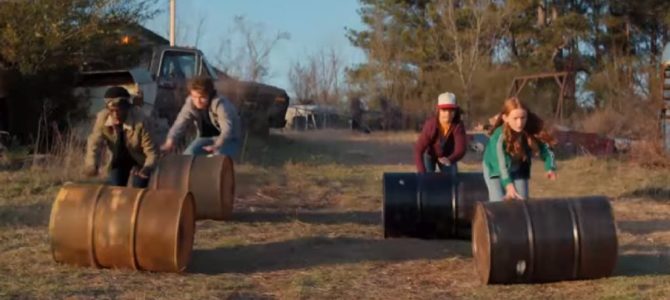
Spoilers ahead.
“Stranger Things” is overrated. It’s a good show, but future generations will look at its massive success as an oddity of a bygone era. If anyone who loves the show, as I do, can separate his feels from his thinks for a few seconds, it becomes clear that the show is not well-scripted.
The first two seasons have essentially been a 2.5-hour film padded into eight or nine hours. It’s the sort of thing we used to consume the way one should eat junk food: quickly and rarely. We love this junk food because, as junk food goes it’s pretty darn good.
That’s because “Stranger Things” is soul food, not junk food. That’s why it works as well as it does. In a world with “Breaking Bad” and “Game of Thrones,” “Stranger Things is like an existential balm. Those shows and their prestige peers are far better-written, with richer story lines and deeper characters.
“Stranger Things” is more like “Downton Abbey” in this respect. “Downton Abbey” got pretty schmaltzy, especially towards the end. If you told people you watched that show because of the quality storytelling, well, you were just lying, weren’t you? “Downton” worked because we loved those characters. The story line was not compelling. In fact, it was relatively nonexistent, almost like an art house soap opera.
The Storyline Is Predictable, But That’s Part of the Appeal
“Stranger Things” does have a decent story, and the second season does show story growth even while repeating some of the exact same 1980s tropes the Duffer brothers have redefined. But ultimately the plot remains simple and predictable. We have seen this story before. It’s in “X-Men,” Star Wars, “E.T.,” “It,” “Dracula,” Lord of the Rings, “Close Encounters,” etc.
This should be a criticism, but in this case it’s hard to make it stick because the predictability is intentional. The Duffers know what their show is. It is not about plot twists or tension and, despite being clearly grounded in the genre of horror, it’s never very scary. In fact the show seems to have the exact opposite effect on fans. We find it comforting, even escapist.
We don’t do so all the time, of course, since the characters’ lives are often in danger. But generally it’s that good kind of danger—call it Indiana Jones or Star Wars danger. It’s the kind of danger where you’re excited to see how our heroes are going to get out of their current jam. We never really believe their lives are in danger. That’s why it’s important that they do kill off characters every now and then. Viewers need to be reminded that these are not superheroes, they are just people.
We’re Drawn to the Depths of Friendship
In many ways, that is the central draw of the show, especially for people like me who didn’t grow up in the ‘burbs. Despite being an expensive sci-fi show, “Stranger Things” is really about small-town friendship or, to put it in the most pretentious way possible, Tocquevillian community. There’s some romance, but even the romantic relationships in the show are actually friendships within a community (which is what all true romance should be based on anyway). It’s those little nuances that soothe our souls.
In “Breaking Bad,” relationships and friendships are things to be exploited—and rightly so, since that show is about the tragic rise and fall of a drug kingpin. In a tragedy, friendship is a snare. In a comedy, it is life itself. “Stranger Things” is no comedy, despite being consistently funny, but the point is that traditionally there were really just the two genres. In tragedy everyone dies, and in comedy everyone gets married.
Today our story genres are far more complex, while the stories themselves have mostly became inane. But whatever “Stranger Things” may be, it has no sense of tragedy. The goal of life in the little fictional town of Hawkins is other people, not money or stuff. The goal is just perpetuating friendship as the stuff of real life.
“Stranger Things’” worldview can be best explained as essentially hopeful. Two characters new to season two demonstrate this perfectly: Paul Reiser’s scientist/doctor and Sean Astin’s dorky everyman nerd. The Duffers use cultural references to build expectations cleverly. When a nerd like me thinks of Reiser, we don’t think about some sitcom from the ’90s co-starring Helen Hunt. We think of Weyland Yutani. We remember the corporate sleaze who got Ripley to go back to the hell of LV-426 then tried to have her and Newt impregnated with Xenomorphs (go watch “Aliens” if this sounds like Yiddish to you).
Based on the events of the first season, Reiser’s association with the government and the lab makes him seemed primed for betrayal. Every time he says “Trust me,” a nerd thinks of Ripley. So here the Duffers play against expectations via a very deep nerd culture cut, because Reiser’s doctor actually is a good guy, so good that he sacrifices himself to save the others, the exact opposite of what he does in “Aliens.”
Playing Against Type With the Best Friend Character
Astin’s character is the exact same one Astin has always played. He’s Samwise, Rudy, and Mikey from “The Goonies.” He’s the plucky, naive good guy. He’s the guy who rations the Lembas bread for the return trip home, despite all the evidence that Frodo and Sam are never going home. The Duffers also use this to convince us that he’s going to turn bad. Each moment he’s alone onscreen with another character, we get the sense that Astin was cast in this film as a clever anti-type. There’s this constant feeling that he is about to snap.
The best example is when he mentions that his camcorder was a little banged up. We think he’s about to reveal that he’s a psycho only concerned with his tech toys. But he doesn’t even care about the camcorder. He was worried about Will. He genuinely likes Joyce and her boys, and believes Will is a good kid who would never be irresponsible with something as expensive as a camcorder.
So he watches the tape to see what happened. Sure enough, Will was being bullied by some older kids, and that’s why he dropped it. That’s the only thing he wants Joyce to know: your son was being bullied. He never turns psycho. A “clever” script would have used our associations with Astin to hide his treacherousness. But the Duffers don’t want to be too clever, and Astin’s onscreen persona remains a truly good guy, so good that he also sacrifices himself for the others. Hopefulness, genuine friendship, and self-sacrifice. That is what makes this show meaningful. Small-town virtues.
Things We Can All Still Agree On
David Harbour might tell you otherwise. Maybe he thinks it’s a metaphor for punching Nazis, that the dark entity threatening Hawkins’ existence is an allegory for President Trump. If so, it may be the most ironic attempt at politicizing a narrative I’ve ever heard of, because Hawkins is in Indiana, Vice President Mike Pence’s state. Indiana is certainly a part of middle America, and all the characters in the show are essentially middle-class midwesterners. They’re basically Trump supporters—of course “Trump supporters” from the fictional ‘80s, but regardless they fit the profile.
A further irony beyond just the potential use of the idiotic “Handmaid’s Tale” Hermeneutic: This show seems to be popular with everybody. The critics love it, it’s won awards, and the rest of us nerds and normalos liked it, too. Yet this is a show produced by progressive elites. They can’t get much of their political agenda across in a period piece, of course, so that’s mostly muted.
But what isn’t muted is the love of small-town community. The love of innocent friendship and respect for a simple rule like “friends don’t lie.” The need for courage when facing monsters. The differences that divide us are mostly sound and fury. Under the layers of virtue signals and identity armor, leftists are just as lonely and scared as everyone else. That’s why this show speaks so strongly to us today.
It’s the same reason everyone loves “Casablanca” and “It’s a Wonderful Life” but merely appreciate Citizen Kane. Rick Blaine and George Bailey make us feel things. They help us see in the most basic way that altruism is a fundamental part of life, that giving ourselves makes us more complete.
Our country seems more divided every day. And then out of nowhere comes this weird little show. And it doesn’t divide us. It isn’t controversial. It’s just nice. It’s about things we can all agree on. It could not have come along at a more perfect time. For that reason, it doesn’t matter if it ages well. Sometimes things need to be of their times. And sometimes the best way to serve our times is to tell a story that happened a long, long time ago in a decade that seems far away.









